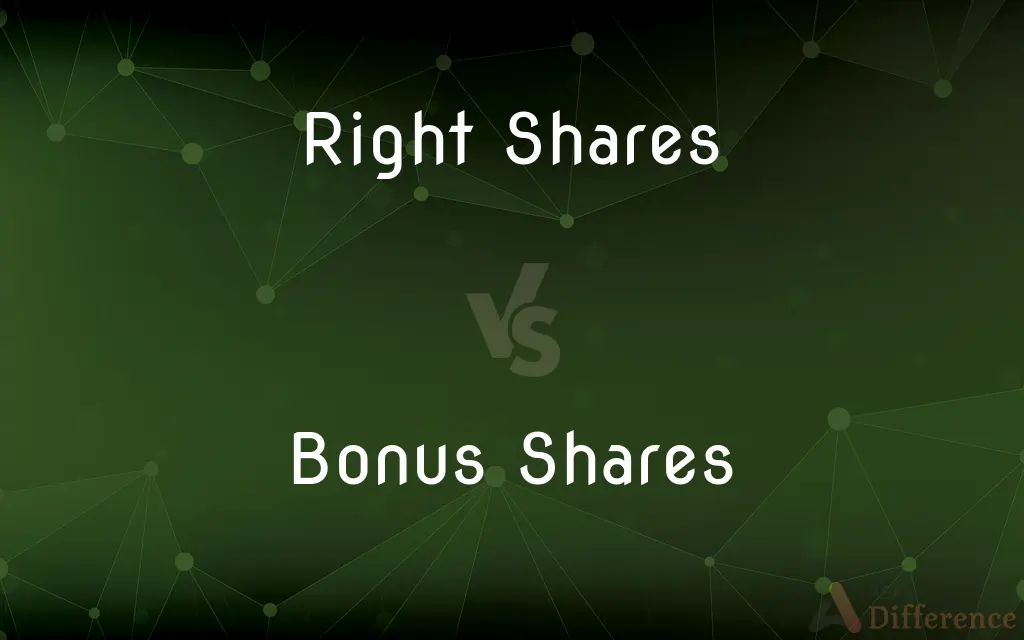Right Shares vs. Bonus Shares — What's the Difference?
Right Shares vs. Bonus Shares: Right Shares are offered to existing shareholders at a discount, while Bonus Shares are additional shares given free based on held shares.

Difference Between Right Shares and Bonus Shares
Table of Contents
ADVERTISEMENT
Key Differences
Right Shares are a type of offering by companies where existing shareholders are given the privilege to buy additional shares at a discounted price. On the other hand, Bonus Shares are extra shares given to current shareholders without any additional cost.
Companies issue Right Shares to raise capital without increasing their debt. These shares often come with a limited period to exercise the right. Conversely, Bonus Shares are issued from a company's accumulated earnings and do not affect its cash reserves.
The main objective of issuing Right Shares is to ensure that the company's ownership remains largely with the existing shareholders while getting additional capital. In contrast, Bonus Shares are a way to reward shareholders and increase the share capital without affecting the cash reserves.
When Right Shares are offered, shareholders can choose to buy the additional shares or sell their rights to other investors. Bonus Shares, however, are automatically credited to the shareholders' accounts based on the number of shares they hold.
While Right Shares might result in the dilution of earnings per share if all shareholders exercise their rights, Bonus Shares merely alter the number of shares in circulation without changing the total earnings.
ADVERTISEMENT
Comparison Chart
Nature of Issue
Offer to buy at a discount.
Free additional shares.
Purpose
Raise capital.
Reward shareholders & increase share capital.
Effect on Cash Reserves
Can increase cash reserves.
No effect on cash reserves.
Optionality
Shareholders can choose to buy or not.
Automatically credited to shareholders.
Effect on Earnings
Potential dilution of earnings per share.
No change in total earnings.
Compare with Definitions
Right Shares
A privileged offering allowing current shareholders to buy additional shares.
As a loyalty gesture, the firm provided Right Shares to its investors.
Bonus Shares
A method to increase share capital without affecting cash.
Instead of dividends, the company decided to give out Bonus Shares.
Right Shares
Shares that shareholders can choose to buy or transfer their rights.
Some investors opted to sell their Right Shares in the open market.
Bonus Shares
Shares credited to shareholders without any payment.
Shareholders were pleased with the unexpected Bonus Shares in their accounts.
Right Shares
Shares offered to existing shareholders at a discounted price.
The company issued Right Shares to fund its new project.
Bonus Shares
A gesture of rewarding shareholders by capitalizing reserves.
The company's strategy often involved rewarding with Bonus Shares rather than cash payouts.
Right Shares
Shares offered pro-rata to the existing shareholders.
Through Right Shares, shareholders maintained their ownership percentage.
Bonus Shares
Additional shares distributed from accumulated earnings.
The firm's consistent profitability allowed for the distribution of Bonus Shares.
Right Shares
A way for companies to raise capital without adding debt.
The board approved the issuance of Right Shares to avoid external borrowing.
Bonus Shares
Free extra shares given to shareholders based on the shares they own.
As a reward, the company issued Bonus Shares to all its investors.
Common Curiosities
How do Bonus Shares differ from Right Shares?
Bonus Shares are free additional shares given to shareholders, while Right Shares are offered at a discount and can be purchased.
Why do companies issue Right Shares?
Companies issue Right Shares to raise capital without increasing their debt and to ensure existing shareholders maintain ownership.
How are Bonus Shares funded?
Bonus Shares are typically funded from a company's accumulated earnings or reserves.
What are Right Shares?
Right Shares are shares offered to current shareholders at a discount, allowing them to buy additional shares.
How do Bonus Shares benefit shareholders?
Bonus Shares increase the number of shares a shareholder owns without any additional investment.
Can a shareholder sell their rights from Right Shares?
Yes, shareholders can either buy the Right Shares or sell their rights to other investors.
Are Right Shares always issued at a discount?
Typically, Right Shares are issued at a discount to the current market price to incentivize shareholders.
Do Bonus Shares affect a company's cash reserves?
No, Bonus Shares do not impact a company's cash reserves as they are issued from accumulated earnings.
What happens if a shareholder doesn't exercise their Right Shares?
If not exercised within the stipulated period, the right lapses, and the shareholder loses the opportunity to buy at the discounted price.
Is there any financial benefit to companies issuing Bonus Shares?
While it doesn't bring in capital, Bonus Shares can help increase liquidity in the stock and convey company health and confidence.
Share Your Discovery

Previous Comparison
Inhibition vs. Restraint
Next Comparison
Retail Banking vs. Universal Banking












































